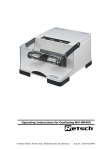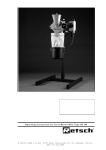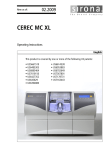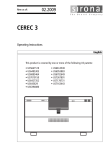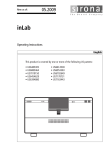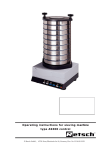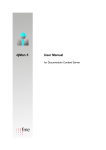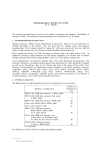Download Operating Instructions for Mortar Mill RM200
Transcript
Operating Instructions for Mortar Mill RM200 © Retsch GmbH, 42781 Haan, Rheinische Str.36, Germany Doc.Nr. D 98.455.9999 Notes on these operating instructions These operating instructions for the mortar mill, type RM200, give all the necessary information on the areas mentioned in the contents. They instruct the target group(s) for each of the defined areas, in order to ensure safe handling of the RM200 when used for the intended purpose. Knowledge of the relevant section is an essential precondition for safe, proper use of the machine. This technical documentation is a reference work and also a set of teaching instructions. The individual sections are complete in themselves. These operating instructions do not include instructions for repairs. In case of possible defects or necessary repairs please contact your suppliers or Retsch GmbH direct: Retsch GmbH www.retsch.com 20.02.2007 2 © Retsch GmbH Doc.Nr.D98.455.9999 Notes on these operating instructions .................................... 2 Safety ..................................................................................... 4 Safety instructions ...........................................................................4 Warning signs .................................................................................5 Repairs...........................................................................................5 Confirmation ...................................................................................8 Technical data ......................................................................... 9 Use according to the intended purpose................................................9 Emissions .......................................................................................9 Protective system: IP53 ...................................................................9 Rated power: 230 Watt....................................................................9 Machine dimensions .........................................................................9 Required floor space.........................................................................9 Transport and installation ..................................................... 10 Packing ........................................................................................ 10 Transport...................................................................................... 10 Intermediate storage...................................................................... 10 Supplied items .............................................................................. 10 Conditions for the place of installation............................................... 11 Installation ................................................................................... 11 Electrical connection....................................................................... 11 Operation .............................................................................. 12 Operating elements and operation .................................................... 12 Operating elements and their function .............................................. 13 View of milling chamber.................................................................. 15 Installing / changing the milling fittings............................................. 16 Installing or changing the mortar ..................................................... 16 Installing or changing the pestle ...................................................... 17 Adjusting the pestle ....................................................................... 18 Adjusting the pestle pressure........................................................... 18 Adjusting the Scraper to the Mortar .................................................. 19 Checking the scraper setting............................................................ 20 Control milling operation ................................................................. 20 Adjusting the milling time ............................................................... 20 Stopping the milling process ............................................................ 22 Replacing the machine fuses............................................................ 22 Working instructions............................................................. 23 General ........................................................................................ 23 Materials ...................................................................................... 23 Crushing, mixing and milling of samples with grain size < 3mm............ 24 Crushing, mixing and milling materials of grain size > 3 mm ................ 25 Security advice for handling liquid nitrogen........................................ 26 Safety functions and fault displays ....................................... 27 Safety functions............................................................................. 27 General ................................................................................. 28 Cleaning ....................................................................................... 29 Maintenance.................................................................................. 29 Accessories RM200......................................................................... 29 Wear............................................................................................ 30 Readjusting the lock pre-tensioning .................................................. 30 Wearing parts................................................................................ 30 Checks ......................................................................................... 30 Copyright ..................................................................................... 30 Alterations .................................................................................... 30 Summary of safety regulations for the RM200 .................................... 31 Warranty conditions.............................................................. 32 20.02.2007 3 © Retsch GmbH Doc.Nr.D98.455.9999 Safety Target group:All persons concerned with the machine in any way. The RM200 is a modern, highly efficient product of Retsch GmbH, corresponding to state of the art. If the machine is used according to the intended purpose with a knowledge of this technical documentation it is completely safe and reliable to operate. Safety instructions As the operating authority it is your duty to ensure that all persons charged with working on the RM200: • have read and understood all the instructions on safety, • before beginning work know all the instructions and regulations for the target group relevant to their work, • have access to the technical documentation for this machine at all times, without problems. • New personnel should be familiarized with safe, proper handling of the machine before beginning work on the RM200, either by verbal instruction from a competent person or through this technical documentation. • Improper operation can cause injury to persons or damage to the equipment. You are responsible for your own safety and that of your employees. • Ensure that no unauthorised persons have access to the RM200. For your own protection have your employees confirm that they have been instructed in operation of the RM200. The draft of a suitable form is given at the end of the section on safety. We exclude any claims for damages of any kind for injury to persons and damage to equipment arising from non-observance of the following safety instructions. 20.02.2007 4 © Retsch GmbH Doc.Nr.D98.455.9999 Warning signs Warnings are given by the following signs: Injury to persons Damage to equipment Observe instructions for use Repairs These operating instructions do not include repair instructions. For your own safety repairs must be carried out only by Retsch GmbH or an authorised agent (service technicians). In this case please contact: The Retsch agency in your country Your supplier Retsch GmbH directly Your service address: ______________________________________ ______________________________________ ______________________________________ ______________________________________ 20.02.2007 5 © Retsch GmbH Doc.Nr.D98.455.9999 Safety instructions We exclude any claims for damages of any kind for injury to persons and damage to equipment arising from non-observance of the following safety instructions. Use according to the intended purpose Do not make any alterations to the machine and use only spare parts and accessories approved by Retsch.Otherwise the Declaration of Conformity with the European Directives by Retsch loses its validity.Furthermore this will result in the loss of any kind of guarantee claim. Packing Please keep the packing material for the duration of the guarantee period since if there is a complaint and the machine is returned with inadequate packing your guarantee claim will be at risk. Transport The RM200 must not be knocked, shaken or thrown during transport. Otherwise the electronic and mechanical components can become damaged. Temperature variations If temperature variations are high (e.g. during air transport) the RM200 must be protected against condensed water. Otherwise the electronic components can become damaged. Supplied items If the delivery is incomplete and / or there is transport damage you must inform the transporter and Retsch GmbH immediately (within 24 hrs). Later complaints may possibly be no longer considered. Conditions for the place of installation If the ambient temperature drops below or exceeds these values the electronic and mechanical components can become damaged and performance data are changed to an unknown extent. At higher atmospheric humidity the electronic and mechanical components can become damaged and performance data are changed to an unknown extent. Electrical connection If the values on the type plate are not observed this can result in damage to the electrical and mechanical components. Installing or changing the mortar Ensure that the mortar has engaged properly in the groove of the plate.Otherwise the mortar will be damaged when starting the machine. When removing and opening heated milling cups protective gloves must be worn.Danger of burning the hands. Installing or changing the pestle Make sure that the pestle is locked in position. Otherwise it may fall out when the lid is closed and damage the mortar. Adjusting the Scraper to the Mortar The scraper can become sharp-edged as a result of sanding and wear during grinding operations. During cleaning in particular there is a risk of injury. Adjusting the scraper contact pressure If the scraper pressure is set too high this causes rapid wear of the scraper and contamination of the material to be milled through the scraper material. If the scraper pressure is set too high this increases the motor load and can cause triggering of the overload protection switch on the rear side of the machine. Adjusting the milling time The milling operation can be started only if the lid is closed. 20.02.2007 6 © Retsch GmbH Doc.Nr.D98.455.9999 Please take all necessary measures, depending on the dangerousness of your sample, to prevent danger to persons. Please note that the properties, and therefore the dangerousness of your sample, can change during the milling process. General Observe the relevant regulations and guidelines of your country for handling chemicals and hazardous materials. These should be applied when working with the RM200. Materials Milling of materials with a risk of fire or explosion in the RM200 is prohibited. Please take the necessary measures, depending on the dangerousness of your sample, to avoid danger to persons. Please not that the properties, and therefore the dangerousness of your sample, can change during the milling operation. Crushing, mixing and milling of samples with grain size < 3mm Do not charge the materials in batches. The mortar and pestle can become blocked, so that the motor is switched off by the controller to protect it from burning out. Do not push material through the opening under the cover I with your fingers. Fingers can be squeezed. Do not introduce any objects through the openings I + J. The mortar, pestle and scraper can become damaged and there is a possible danger of injury. Crushing, mixing and milling materials of grain size > 3 mm Do not add the material in batches. The mortar and pestle can become blocked, which leads to switching off of the machine. Do not push material through the opening under the cover I with your fingers. Fingers can be squeezed. Security advice for handling liquid nitrogen Safety goggles and protective gloves should always be worn when handling liquid nitrogen. Liquid nitrogen has a temperature of –196 °C and, if it comes into contact with the skin or eyes, may cause injuries similar to burns or frostbite. A funnel must be used to fill cooling liquid into the RM 200. Otherwise the cover might be damaged. Please observe the security advice of the liquid nitrogen supplier. Retsch excludes any liability claims which may result from the use of liquid nitrogen or similar substances. Cleaning Do not clean the RM200 with running water. Danger to life through current surgeUse only a cloth moistened with water. Cleaning agents and solvents must not be used – not for cleaning the milling tools either. Accessories RM200 Do not carry out any modification of the machine and use only spare parts and accessories approved by Retsch. Otherwise the declared Conformity with the European Directives by Retsch will lose its validity. Furthermore this will lead to loss of any kind of guarantee claims. Wearing parts These operating instructions do not include repair instructions. For your own safety repairs should be carried out only by Retsch GmbH or an authorised agency and service technicians. 20.02.2007 7 © Retsch GmbH Doc.Nr.D98.455.9999 Confirmation I have taken note of the section „Notes on these operating instructions” and the section on “Safety”. _______________________________________ Signature of operating authority _______________________________________ Signature of service technician 20.02.2007 8 © Retsch GmbH Doc.Nr.D98.455.9999 Technical data Target group: Operating authority, operators Machine type designation: RM200 Use according to the intended purpose This machine is not designed as a production machine but as laboratory equipment, intended for an 8 hours single shift operation with 30% operating time. The RM200 is suitable for dry and wet milling of soft, medium hard, hard, pasty and brittle materials, up to a hardness of 9 on the Mohs’ scale. Furthermore quantities of approx. 10 to 190 ml and a max. charging grain size of 8 mm can be ground and homogenised with the RM200, without manual use of force. A final fineness of down to 0.01 mm (10 µm), and in individual cases even below this value, can be achieved with the RM200. Do not make any alterations to the machine and use only spare parts and accessories approved by Retsch. Otherwise the Declaration of Conformity with the European Directives by Retsch loses its validity. Furthermore this will result in the loss of any kind of guarantee claim. Emissions Noise characteristic values : Noise measurement according to DIN 45635-031-01-KL3 Intensity of sound LWA = 85 dB(A) Emission value related to workplace LpAeq = 72 dB(A) Operating conditions: Material to be milled = quartz sand, grain size < 1 mm Protective system: IP53 Rated power: 230 Watt Machine dimensions Height: Width: Depth : 480 mm up to approx. 550 mm with lid opened 400 mm 370 mm up to approx. 510 mm with lid opened Weight: approx. 24 kg without mortar and pestle Required floor space 400 mm x 400 mm plus space at the rear for the opened lid. No safety distance required. 20.02.2007 9 © Retsch GmbH Doc.Nr.D98.455.9999 Transport and installation Target group: Operating authority, transporter, operators Packing Packing is adapted to the transport route and conforms to generally applicable packaging guidelines. Please keep the packing material for the duration of the guarantee period since if there is a complaint and the machine is returned with inadequate packing your guarantee claim will be at risk. Transport The RM200 must not be knocked, shaken or thrown during transport. Otherwise the electronic and mechanical components can become damaged. Temperature variations If temperature variations are high (e.g. during air transport) the RM200 must be protected against condensed water. Otherwise the electronic components can become damaged. Intermediate storage Ensure that the RM200 is also stored dry during intermediate storage. Supplied items • RM 200 • 1 power supply cable • tools • 1 set of operating instructions Check completeness of the delivery, including individually ordered accessories. Check perfect functionability of the RM200 (see also section on operation). If the delivery is incomplete and / or there is transport damage you must inform the transporter and Retsch GmbH immediately (within 24 hrs). Later complaints may possibly be no longer considered. 20.02.2007 10 © Retsch GmbH Doc.Nr.D98.455.9999 Conditions for the place of installation Ambient temperature: 5°C to 40°C If the ambient temperature drops below or exceeds these values the electronic and mechanical components can become damaged and performance data are changed to an unknown extent. Atmospheric humidity: Maximmum relative humidity 80% at temperatures up to 31°C, decreasing linearly down to 50% relative humidity at 40°C. At higher atmospheric humidity the electronic and mechanical components can become damaged and performance data are changed to an unknown extent. Installation height: max. 2000 m above sea level Installation Mount the RM200 only on a firm, stable laboratory bench since otherwise vibrations can be transmitted. Electrical connection • Voltage and frequency for the RM200 are given on the type plate. • Ensure that these values correspond to the available power supply system. • Connect the RM200 to the power supply system using the supplied connection cable. • Protection by external fusing is to be used when connecting the mains cable to the power supply, according to the regulations at the place of installation. • The voltage supply to the RM200 must be provided with a fault-current circuit breaker (FI switch). If the values on the type plate are not observed this can result in damage to the electrical and mechanical components. 20.02.2007 11 © Retsch GmbH Doc.Nr.D98.455.9999 Operation Target group: Operators Operating elements and operation Diagram of operating elements: J I H G L K M F E D Front view A B 20.02.2007 Rear view 12 C © Retsch GmbH Doc.Nr.D98.455.9999 Operating elements and their function General plan Element Description Function A Machine socket Connection for power cable of machine B Fuse compartment Takes two visible type fuses C Type plate Information on the machine and connected loads D ON/OFF switch For switching the RM200 on and off E Display and operating unit: For explanations see below Time preselection and starting / stopping the machine F Closing grip For opening and locking the millling chamber G Turning handle – pestle pressure Turning alters the pestle contact pressure adjustment H Scale Setting guide for pestle pressure I Filling opening Sample material is filled here J Viewing window Viewing possibility during the milling process, particularly for adjusting the scraper K Setting knob for scraper Sets the contact pressure or gap of scraper L Pestle setting knob For adjusting the pestle on the mortar wall M Hood Closes the milling chamber 20.02.2007 13 © Retsch GmbH Doc.Nr.D98.455.9999 Display and operating unit E U T S R N Element N O Q P Description Function Load Control – load indicator Shows the actual load of the drive motor. Helps the user to avoid overloading and overload circuit breaking. Display = 1 to 4 green LEDs Loading is OK Display = 4 green + 1 yellow LED Slight overloading. Increasing the load can cause circuit breaking. Display = 4 green + 1 yellow + 1 red LED Overloading! Continuous overloading with the red display switches off the control of the drive. O Time – minus button In the adjusting mode and operating mode: decrease in the adjusted milling time by one minute. Continuous pressing switches off fast running. P Time – plus button In the adjusting mode and operating mode: increase in the adjusted milling time by one minute. Continuous pressing causes fast running. Q Start button Starts the milling operation R Stop button Interrupts or ends the milling operation S Red LED Indicates stand-by mode T Green LED Indicates milling operation U Two digit display Indicates the set milling time or, during operation, the milling time still remaining. Setting range: 1 to 99 minutes plus “- -“ for continuous operation. 20.02.2007 14 © Retsch GmbH Doc.Nr.D98.455.9999 View of milling chamber X Z Y V W Element Description Function V Pestle Crushes and mills the material W Mortar Contains the material to be milled X Scraper Mixes the milled material and scrapes off material adhering to the mortar Y Fixing screw for scraper Holds the scraper with the screwed-on fixing clamp Z Fixing clamp for scraper Clamps the scraper 20.02.2007 15 © Retsch GmbH Doc.Nr.D98.455.9999 Installing / changing the milling fittings If the RM200 has been ordered or supplied with milling fittings the mortar, pestle and scraper will have already been adjusted at the works. F If a new set of milling fittings is installed the pestle and scraper must be readjusted or positioned. The mortar and pestle should always be made of the same material. Fig. 1 Installing or changing the mortar • Hold the closing grip F at the bottom and pull. Fig.1 W • Pull the hood upwards with the grip to open. Fig.1 • Remove mortar W Fig.2 • Place a new mortar in position and lock this in the groove of the plate Tn Fig.3 Fig. 2 W Tn Fig. 3 Ensure that the mortar has engaged properly in the groove of the plate. Otherwise the mortar will be damaged when starting the machine. When removing and opening protective gloves must be worn. Danger of burning the hands. 20.02.2007 16 © heated milling cups Retsch GmbH Doc.Nr.D98.455.9999 Installing or changing the pestle • Remove the pestle V horizontally from its holder while holding the hood firmly Fig.4 V • Insert a new pestle into the holder until it noticeably engages. • If the pestle does not engage turn this slightly and, if necessary, hold the holder firmly with the other hand so that the locking pins can engage at this position. Fig.5 To prevent contact corrosion, take the pestle out of the machine if the machine is idle for a long time. Fig. 4 Ensure that the pestle bolt Pb is not contaminated. Pa No dirt should get into the pestle holder Pa Fig.4.1 Pb Fig. 4.1 Make sure that the pestle is locked in position. Otherwise it may fall out when the lid is closed and damage the mortar. 20.02.2007 17 © Retsch GmbH Doc.Nr.D98.455.9999 Adjusting the pestle G Fig.5 H • The mortar V is installed • The pestle W is installed and locked in position • Close the lid M and press the closing grip F shut. L • Turn the rotary grip G anticlockwise and remove. • Start the machine by switching on with the on/off switch D and pressing the start button Q Fig.5 • Move the pestle forwards. To do this turn the pestle knob L to the left until this reaches the stop. The setting range is only a few millimeters for several rotations of the setting knob. • Then move the pestle backwards again until resistance is felt. To do this turn the pestle knob L to the right. Fig. 7 • In Fig.7 the optimum setting has been reached since the lower rounded surface of the pestle is now running in the lower rounding of the mortar. • As soon as the pestle shaft is pressed upwards during the setting process the pestle moves upwards on the mortar wall and setting is no longer optimum. In this case turn the pestle knob back slightly. W Fig.6 Adjusting the pestle pressure The correct pestle pressure should be determined by carrying out tests and depends on the material to be milled and the required degree of fineness. Increasing the pressure: Fig.5 • Turn the sleeve G clockwise • This increases the pressing force downwards Fig.7 • The value can be read off on scale H Reducing the pressure: Fig.5 • Turn the sleeve G anticlockwise • The values on scale H are reduced Fig.7 20.02.2007 The values indicated on scale H are only for use as a guide during setting. They can be used as an aid in reproducing the conditions. However, no mathematical conclusion regarding the contact pressure is possible since this depends on the material to be milled. 18 © Retsch GmbH Doc.Nr.D98.455.9999 Adjusting the Scraper to the Mortar A M When the machine is delivered or when a scraper is re-ordered, it may be necessary to regrind scraper A. This depends on the shape of the mortar M or the wear on it. Fig.7.1 Regrinding is necessary in the following cases: • when the machine is supplied without a mortar or grinding set • when a scraper or mortar is reordered Fig.7.1 delivery condition ground The scraper was chamfered slightly in the factory in order to make regrinding easier. The grinding angle should be 45° and depend on the shape of the mortar. A Fig.7.1 und Fig.7.2 You can use a belt sander, a grindstone or sandpaper to do the grinding. Fig.7.2 The scraper can become sharp-edged as a result of sanding and wear during grinding operations. During cleaning in particular there is a risk of injury. The required contact pressure of the scraper X must be determined empirically, depending on the material to be milled and the required degree of fineness. Increasing the contact pressure: Fig.10 • Turn the scraper adjusting knob K anticlockwise Reducing the contact pressure: • Turn the scraper adjusting knob K clockwise Fig.10 If the scraper pressure is set too high this causes rapid wear of the scraper and contamination of the material to be milled through the scraper material. If the scraper pressure is set too high this increases the motor load and can cause triggering of the overload protection switch on the rear side of the machine. 20.02.2007 19 © Retsch GmbH Doc.Nr.D98.455.9999 Checking the scraper setting The scraper fulfils its function only if adjustment of the contact pressure and contact with the bottom of the mortar is optimum. This can best be assessed by carrying out a neutral milling operation. Control milling operation We recommend the following mixture as neutral milling material: Incorrect Fig.11 e.g. 4 – 5 teaspoons of powder sugar 5 – 10 ml water • Close the lid with the mortar empty and press the closing grip shut. • Turn the rotary grip G to setting „0“ of scale H • Switch on the machine, start the operation by pressing the start button Q. • Add the powder sugar through the right-hand window opening I of the lid, then pour in the water. Correct Fig.12 A pasty mixture is formed which does not adhere to the inside wall or to the bottom of the mortar if the scraper has been adjusted correctly. See Fig.11 and 12 For visually checking look through the left-hand window J Adjusting the milling time The milling time can be adjusted with the display and operating unit E • Switch on the RM200 with switch D. Fig.13 Preselecting the time • Set the required milling time with the + / - buttons O and P Fig.14 • Short pressing of the + or – button changes the milling time by one minute in each case. With longer pressing the display runs through continuously. Fig.13 20.02.2007 D If 99 is exceeded the display U shows two minus signs: -- This setting means continuous operation 20 © Retsch GmbH Doc.Nr.D98.455.9999 without automatic switching off. O R U Starting the milling operation • When the lid is closed: • The milling operation is started with the start button Q. Fig.13 • Fig.14 P The milling time is recorded and the remaining milling time is indicated in display U. Q The milling operation can be started only if the lid is closed. Please take all necessary measures, depending on the dangerousness of your sample, to prevent danger to persons. Please note that the properties, and therefore the dangerousness of your sample, can change during the milling process. 20.02.2007 21 © Retsch GmbH Doc.Nr.D98.455.9999 Stopping the milling process • Press the stop button R . Fig.14 Pressing the button once interrupts the milling operation in order that, for example, the material to be milled can be assessed. The remaining milling time is still visible in the display U . By repressing the start button the mill continues to run until the milling time has completely elapsed. • Pressing the stop button twice stops the milling operation and the machine is then in the stand-by mode. • By pressing the start button the display is reactivated and the milling time is reset to the last start value. During the milling operation the time can be adjusted by pressing the + or – button. The milling operation is automatically ended after the milling time has elapsed. The display is reset to the last started value. Replacing the machine fuses The following visible type fuses are required for the RM200: A 2 MT 3.15 A for 230V machine B 2 MT 6.30 A for 100V to 120V machine Replacing the fuses Fig.15 Fig.15 20.02.2007 • Unplug mains plug from the machine socket A • Unlock and remove the fuse compartment B by pressing the locking device upwards. • Replace the fuses • Insert fuse holder B 22 © Retsch GmbH Doc.Nr.D98.455.9999 Working instructions Target group: Laboratory assistant General The RM200 mills through pressure and friction. This combination of two loading mechanisms enables both soft and hard, brittle material to be crushed, milled and mixed in this machine. Both dry and wet milling operations can be carried out in the RM200. Materials which are difficult to mill can be made brittle by cooling, or can be prepared by mixing with milling auxiliary agents. Please ask your Retsch contact for advice on this. Observe the relevant regulations and guidelines of your country for handling chemicals and hazardous materials. These should be applied when working with the RM200. You should also take into consideration the health protection regulations concerned with the function of health-hazardous dusts, e.g. • BGR 217* „Handling mineral dust“ • BGI 504-1-1* and BGI 504-1-4* „Dust exposure – industrial preventive medicine“ • BGR 120* „Directives for laboratories“ (* German federal laws) Materials The RM200 is suitable for dry and wet milling of materials of all kinds, with the following possible properties: • soft • medium hard • hard • pasty or • brittle. The maximum hardness of the materials can be up to 9 on the Mohs’ scale. Milling of materials with a risk of fire or explosion in the RM200 is prohibited. Please take the necessary measures, depending on the dangerousness of your sample, to avoid danger to persons. 20.02.2007 23 © Retsch GmbH Doc.Nr.D98.455.9999 Please not that the properties, and therefore the dangerousness of your sample, can change during the milling operation. Quantities from approx. 10 to 190 ml and a max. charging grain size of 8 mm can be milled and homogenised with the RM200, without any manual use of force. The ideal filling quantity depends on the sample quantity and the properties of the materials to be milled. Selection of the milling tools depends on the sample material and the subsequent analysis. Different milling tools have different characteristics, e.g. the materials contained in them, hardness or abrasion resistance. For reliable analytical results you should select the milling tools in such a way that the milling process is neutral with regard to contamination. Please ask for advice in case of doubt. G I Crushing, mixing and milling of samples with grain size < 3mm Connect the RM200 to the power supply, switch on and start. The sample is slowly added to the rotating mortar through the filling opening I . For this purpose the right-hand Plexiglass cover I is opened. Fig.16 The pestle, which is offset in relation to the centre of the mortar, presses on the bottom of the mortar and the material to be milled through spring tension and its own weight. Through the resulting friction the pestle is also rotated with the mortar and this crushes the material to be milled through pressure and friction. The pressure can be varied by means of the rotary grip G Fig.16 Fig.16 The scraper ensures that the sample material is scraped off the inside wall of the mortar, recirculated and refed to the milling gap between the pestle and mortar. This forced feeding of the material ensures that the complete sample quantity is well mixed and that every particle is continuously fed to the milling and pulverizing process. Fig.17 N Load Control and safety switch off The load indicator “Load Control” N Fig.17 and 18 serves as a guide for the user. It indicates loading of the drive motor in 6 stages. At low to full load 1 to 4 green LEDs light up. At slight overloading a yellow LED lights up in addition. 20.02.2007 24 © Retsch GmbH Doc.Nr.D98.455.9999 In the case of definite overloading the red LED lights up additionally and thus signals that the machine will soon be switched off. This switch-off takes place when overloading for 90 secs is measured within a short period. The machine is also switched off if it comes to a standstill for 10 seconds through blockage. Fig.18 Do not charge the materials in batches. The mortar and pestle can become blocked, so that the motor is switched off by the controller to protect it from burning out. Do not push material through the opening under the cover I with your fingers. Fingers can be squeezed. Do not introduce any objects through the openings I + J. The mortar, pestle and scraper can become damaged and there is a possible danger of injury. Crushing, mixing and milling materials of grain size > 3 mm N I Close the RM200 and switch on. Precrushing: Fig.14 • Loosen the rotary grip for adjusting the pestle G down to scale setting “0” The pressure of the pestle on the mortar is now minimum. • Start the milling operation. • Add the material to be milled slowly through the charging opening I Fig. 19 Fine milling: Fig.14 • Increase the pestle pretension again by turning the rotary grip G clockwise. 20.02.2007 25 © Retsch GmbH Doc.Nr.D98.455.9999 Do not add the material in batches. The mortar and pestle can become blocked, which leads to switching off of the machine. Do not push material through the opening under the cover I with your fingers. Fingers can be squeezed. Security advice for handling liquid nitrogen Safety goggles and protective gloves should always be worn when handling liquid nitrogen. Liquid nitrogen has a temperature of –196 °C and, if it comes into contact with the skin or eyes, may cause injuries similar to burns or frostbite. Tr I Safety goggles also give protection against eye injuries cause by flying fragments of glass from glass containers, which may burst owing to cold tensions. The RM 200 can also be used for cryogenic grinding. Please note that the cooling liquid must be filled in via a funnel to avoid damages of the cover of the RM 200. Place a standard funnel Tr into the feed opening I. Pour liquid nitrogen into the funnel and take care that the liquid does not get in contact with the cover. Fig. 19.1 Fig.19.1 A funnel must be used to fill cooling liquid into the RM 200. Otherwise the cover might be damaged. Please observe the security advice of the liquid nitrogen supplier. Retsch excludes any liability claims which may result from the use of liquid nitrogen or similar substances. 20.02.2007 26 © Retsch GmbH Doc.Nr.D98.455.9999 Safety functions and fault displays Safety functions F1 - Overloading F1 03 In order to prevent overloading of the drive motor and resulting danger to the operator the RM200 is provided with a load control. This continuously measures the actual motor load and indicates this in the load control display. In case of overloading the load control switches off the machine in good time and guarantees a cooling time. This is indicated to the operator by the alternately flashing display F1 and the remaining cooling time, e.g. 03 = 3 minutes. After the cooling time has elapsed it is only necessary to switch the machine off and on again to operate it normally again. F4 – Hood open F4 If the hood is open the drive should not run. This serves to protect the operator from injury. If the hood is opened while the machine is running the drive is immediately switched off by the controller and “F4” appears in the display. If the start button is pressed with the hood open in order to start the milling operation F4 is also displayed and the drive is not started. This signal can be deleted by pressing the stop button. F5 –Keyboard control F5 If one or more buttons are accidentally pressed for longer than 15 seconds the drive is switched off by the controller and F5 is displayed. This function is intended to prevent unintentional faulty operation if an object accidentally presses on the keyboard. In order to delete this fault signal switch the machine off and on again once. F6 – Switch control for hood switch F6 20.02.2007 If the switch which controls hood opening has a lead defect this is recognised by the controller and causes the machine to be switched off. “F6” appears in the display. To remedy this fault repairs by an authorised Retsch service technician are required. 27 © Retsch GmbH Doc.Nr.D98.455.9999 General Accessories / milling tools Mortar Fig.20 • Mortar of special steel • Mortar of stainless steel • Mortar of agate • Mortar of sintered corundum • Mortar of zirconium oxide • Mortar of hard porcelain • Mortar of tungsten carbide Fig.20 Pestle Fig.21 • Pestle of tungsten carbide • Pestle of special steel • Pestle of stainless steel • Pestle of agate • Pestle of sintered corundum • Pestle of zirconium oxide • Pestle of hard porcelain Fig.21 Scraper Fig.22 • Scraper of PUR (abrasion resistant, rubber type material) • Scraper of beech wood • Scraper of PTFE (Teflon) Fig.22 20.02.2007 28 © Retsch GmbH Doc.Nr.D98.455.9999 Cleaning Do not clean the RM200 with running water. Danger to life through current surge Use only a cloth moistened with water. Cleaning agents and solvents must not be used – not for cleaning the milling tools either. Maintenance The RM200 is maintenance free. When used properly no maintenance and adjusting work need be carried out. Accessories RM200 Designation Material Article No. Mortar RM200/100 Special steel 02.460.0018 Mortar RM200/100 Stainless steel 02.460.0057 Mortar RM200/100 Tungsten carbide 02.460.0021 Mortar RM200/100 Agate 02.460.0098 Mortar RM200/100 Sintered corundum 02.460.0017 Mortar RM200/100 Zirconium oxide 02.460.0086 Mortar RM200/100 Hard porcelain 02.460.0016 Pestle RM200 Special steel 02.461.0112 Pestle RM200 Stainless steel 02.461.0113 Pestle RM200 Tungsten carbide 02.461.0114 Pestle RM200 Agate 02.461.0115 Pestle RM200 Sintered corundum 02.461.0116 Pestle RM200 Zircondium oxide 02.461.0117 Pestle RM200 Hard porcelain 02.461.0118 Scraper PTFE 03.008.0022 Scraper Beech wood 03.008.0023 Scraper PU 03.862.0011 Do not carry out any modification of the machine and use only spare parts and accessories approved by Retsch. Otherwise the declared Conformity with the European Directives by Retsch will lose its validity. Furthermore this will lead to loss of any kind of guarantee claims. 20.02.2007 29 © Retsch GmbH Doc.Nr.D98.455.9999 Wear The scraper and milling tools can wear, depending on the frequency of milling operations and the material to be milled. The scraper should be regularly checked for wear and replaced if necessary. The scraper must be reset before the metal components come into contact with the mortar. Readjusting the lock pre-tensioning V H The lock tension in the lock handle Vg can be influenced by adjusting the rubber buffer GP. Open the hood H and loosen the setscrew Gs. Increasing the lock tension: GP Turn the rubber buffer GP in an anti-clockwise direction Reducing the lock tension: Turn the rubber buffer GP in a clockwise direction Gs Wearing parts These operating instructions do not include repair instructions. For your own safety repairs should be carried out only by Retsch GmbH or an authorised agency and service technicians. Checks The function of the hood switch must be checked regularly: • Switch on the machine with switch D • Start the milling operation with start button Q • Open the closing grip F and lift up the hood • If there is an opening gap of only a few cm the machine is switched off and F4 appears in the display. • Delete F4 with stop button R If switching off does not take place the RM200 must be checked immediately by Retsch service. Copyright Distribution or duplication of this documentation, using and passing on the contents is allowed only with the express permission of Retsch GmbH. Anyone violating is liable to pay damages. Alterations Subject to technical alterations without notice. 20.02.2007 30 © Retsch GmbH Doc.Nr.D98.455.9999 Summary of safety regulations for the RM200 Process Action Danger Safety Injury to persons and damage to the Claims for damages in any form are machine caused through non-observance of excluded the safety instructions Transport Do not knock, vibrate or throw the RM200 Electronic and mechanical components during transport can be damaged Keep the packing material for the duration of Complaint and return of the the guarantee equipment in inadequate packing material puts your guarantee claim at risk Temperature variations If there are temperature variations protect Electronic the RM200 from condensed water damaged Supplied items If the delivery is incomplete and/or there is Later complaints may possibly not be transport damage you must inform the considered. transporter and Retsch GmbH immediately (within 24 hrs). Ambient temperature Drops below 5°C Atmospheric humidity Electrical connection components can be Electronic and mechanical components may be damaged. Exceeds 40°C Performance data are changed to an unknown extent. Exceeds 80% at Electronic and mechanical components can be damaged. temperatures up to 31°C Performance data are changed to an unknown extent. Power supply does not agree with the values Mechanical and electronic components on the type plate can be damaged. Fault current protective switch must be provided in the power supply Prevents current surge if there is an electrical defect in the machine. Installing the mortar Ensure that the mortar is properly engaged Mortar and pestle can be damaged. in the plate slot. Installing the pestle Ensure that the pestle engages properly. The pestle can fall out when closing the hood and damage the mortar. Scraper pressure Set too high Rapid wear to be expected. Contaminates the sample to a greater extent than expected. Increases the motor load and can cause switching off through overloading. Crushing Mixing Milling Do not push sample material opening with your fingers. into Do not objects. in push sample material the Fingers can be squeezed. Mortar, pestle and scraper can be using damaged, danger of injury. Mortar and blocked. pestle can become Do not add sample material in batches. Checks Check hood switch regularly Danger of injury if there is a defect and the machine is open in operation. Cleaning Do not clean with running water. Danger surge 20.02.2007 31 © to life through current Retsch GmbH Doc.Nr.D98.455.9999 Warranty conditions 1. In the case of justified complaints, we will remedy the defect or replace the goods free of charge. The purchaser only has a right to rescind the contract or reduce the purchase price if we have decided that it is not possible or justifiable to remedy the defect, or a replacement delivery cannot be made or the deadline for this cannot be met, or a reasonable period of grace of at least six weeks set by the customer has expired fruitlessly due to our culpability. If the remedial work or the replacement delivery ultimately fail, the customer can demand a reduction in the purchase price or rescind the contract at its discretion. Further-going claims, in particular claims for damages not incurred on the object itself, such as lost production, are excluded insofar as we have been guilty of neither malice aforethought nor negligence. In the case of goods produced by third parties, we pass liability on to the manufacturer(s). 2. We shall bear the direct costs incurred by remedial work or replacement deliveries on the condition that the complaint turns out to be justified. This also applies to the freight costs as well as the costs, within reason, of disassembly and re-assembly. The customer is nevertheless obliged to bear the costs, within reason, of providing its own technicians and assistants on site. If our customer operates abroad, then in deviation to this, we are entitled to pay the costs incurred by the remedial work, in particular costs of transport, tolls and materials, ex German border. 3. The warranty term for newly manufactured goods is two years, for used it is one year. The guarantee refers to deployment in a laboratory in 1-shift operation. In case of multi-shift operation or other areas of application, the guarantee term is shortened accordingly. No warranty is given for parts subject to wear and tear. 4. We guarantee that our goods are free from manufacturing defects. The suitability, classification and function of our goods are determined exclusively on the basis of the performance data specified in the confirmation of order, even if these differ from the order. Should this be the case, the customer may, within two weeks of receiving the order confirmation, notify us of any differences to the order and come to an agreement on these with us. If the customer raises no objections to the specifications in the order confirmation, these are then deemed to have been accepted. Unless an agreement has been made to the contrary, we are not liable for the suitability of the object of delivery for the use to which the customer intends to put them. The same applies to performance data expected by the customer, unless we have been able to carry out appropriate practical laboratory trials in advance, and have declared in writing in our order confirmation that such performance data are binding. 5. Our warranty is also invalidated if persons other than those commissioned by us perform repair work or in any other way interfere with or make alterations to the goods delivered by us, or do not use suitable accessories, insofar as the cause of a defected is connected to these. A further pre-condition for our warranty is compliance with our instructions of operation and use. 6. If the customer installs the goods and/or connects, attaches or incorporates these to other systems or production plant without our prior approval, our warranty is then exclusively restricted to the parts delivered by us. 7. Remedial work on or replacement of defective parts shall take place, at our discretion, either at the place where the object of purchase is installed, or at our company's headquarters. If remedial work is performed on site, the customer shall ensure that our staff has access, unlimited either in time or space, to the object of purchase. In addition, the customer can only demand that the warranty work be performed during normal local business hours. If the customer requests that warranty work be carried out at times outside our normal business hours, it shall then bear the additional costs. If the customer requests other particular services which go beyond the warranty work, these costs are then payable at our current rates. 20.02.2007 32 © Retsch GmbH Doc.Nr.D98.455.9999

































